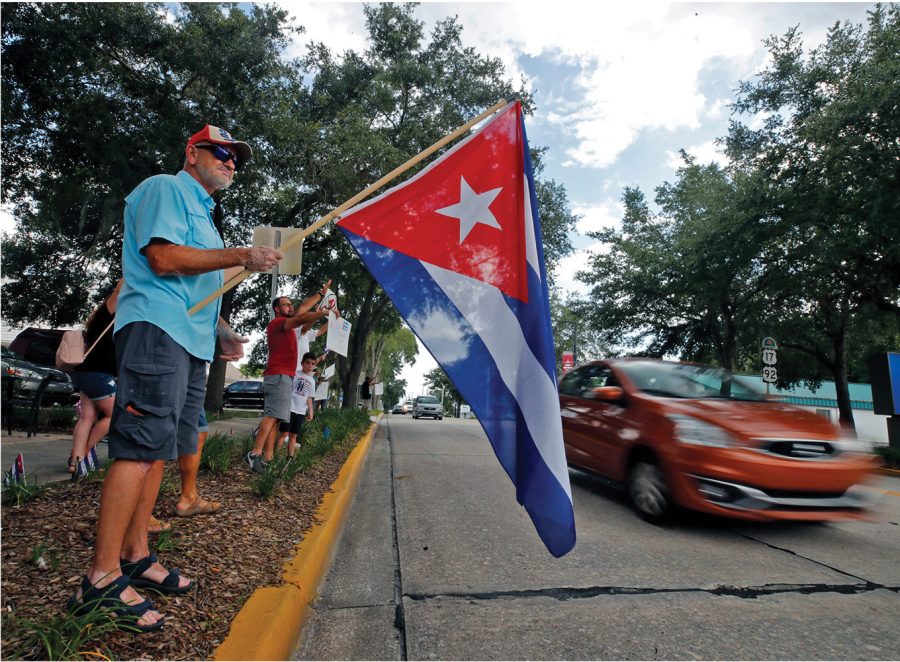Opinion | We need to stand up against countries censoring its people
Cuba is censoring its internet, and it is up to us to stand up for protest rights.
At the south end of downtown DeLand, outside of Chicas Cuban Cafe, about two dozen people gathered on Wednesday, July 21, to show their support for the people of Cuba who have been protesting against the government in unprecedented numbers this month.© Nigel Cook/News-Journal via Imagn Content Services, LLC
August 1, 2021
First Amendment rights are often taken for granted in America, as the everyday person can voice their opinions on the government. However, not every country has such pleasures, including the freedom to assemble.
One of these countries is Cuba. Cubans this past month have been protesting against their government for food and medicine shortages, largely because of COVID-19. While some are only protesting because of the food shortages, some are going further by wanting to overthrow the government.
The Cuban government likely only sees the protests as people fighting against their regime, and is a possible explanation for the recent internet and cellular shutoffs. With the internet and cellular being government-owned, the Cuban government has the power to shut it off, especially with rising public dissent.
This is enormously horrifying, as many Cubans that are protesting are just trying to stop the starvation in their country. Protesting in the U.S. is taken for granted; the freedom to assemble is protected by the first amendment in the U.S., but other countries like Cuba need better protections for its protesters.
This is sadly not the first occurrence of countries censoring its protesters. Global censorship is on the rise, and it is no longer just in authoritarian governments. India is one of the few democracies that shut down its internet in attempts to censor dissent.
India’s officials have the right to order telecommunication companies to shut down the internet for public order. Public order is such a broad excuse to shut off the internet, allowing the government to censor anytime they feel like it.
Internet censorship, as I see it, is something that needs attention immediately, as Cubans are struggling with real issues such as food shortages. Our attention is often focused on our own problems, which although still need our attention, it fails in comparison to censorship around the world.
In America, we have seen multiple push backs against protests, mainly with the Black Lives Matter movement. However, the BLM protests were still able to be seen throughout the world as the U.S. does not censor the internet. The movement received large social media and global news coverage.
People were and are still wildly available to voice their concerts online via multiple social media platforms, which would still allow them to protest. This, however, is not the same in other countries that censor their internet.
Countries like Cuba go beyond shutting off the internet. They also cutoff social media platforms like Twitter, further limiting the people’s voices.
When a government already limits in-person protests, and then takes steps to censor voices online, it leaves their citizens with no way to call attention their problems and few ways for the world to hear them besides international news coverage.
The right to protest and free speech is one that is needed around the world. Governments that censor the internet censors the voices of their people. Voiceless people need help not just from global authorities, but from common citizens who see this as a major issue.
Since the U.S. does not censor its internet, and protects people’s First Amendment rights, Americans should use this privilege to share the message calling upon other countries to follow suit, and allow their people to be heard locally and globally.
Columns reflect the opinions of the authors and are not necessarily those of the Editorial Board, The Daily Iowan, or other organizations in which the author may be involved.



